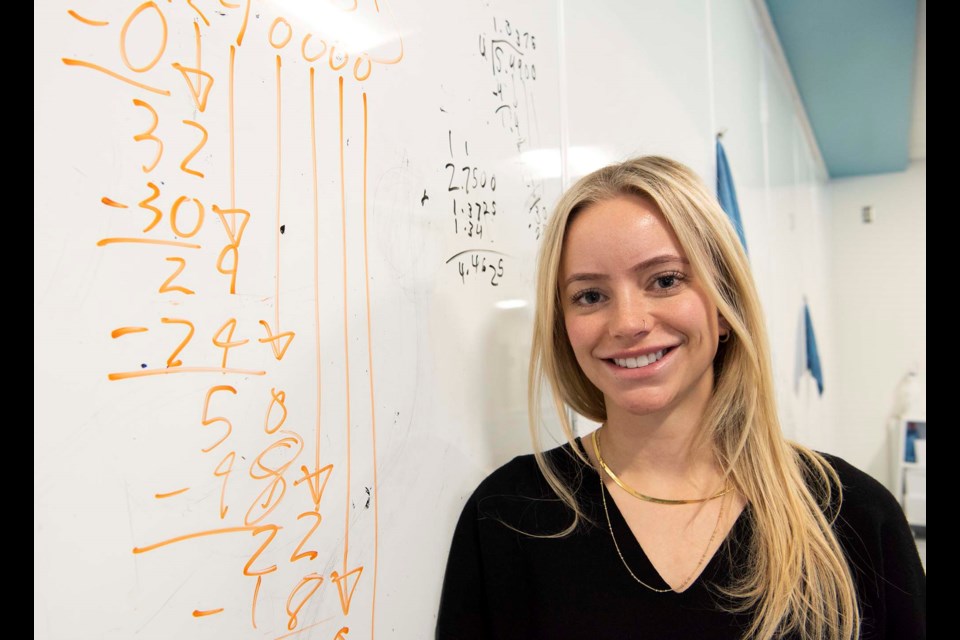The students pipe up immediately. It’s apple juice! There’s no decimal in that “$329” price tag! There’s a can missing! Hey, doesn’t that mean one can is 55 cents?
Soon, Pasemko shows the kids the price for a four-pack of drinks and a dozen eggs and challenges them to figure out what they should pay if they only want to buy, say, seven eggs and three bottles from each package. The students team up and start scrawling equations on the room’s whiteboard desks and walls, sharing strategies about long division and multiplication.
With just a few prompts, pictures, and whiteboards, Pasemko has somehow gotten students excited about math.
The federal government took notice of Pasemko’s methods last month. On Nov. 19, Lacey Brockhoff (now Pasemko) was named as one of this year’s 17 recipients of the Prime Minister’s Award for Teaching Excellence in STEM, which recognizes outstanding science, technology, engineering, or math (STEM) teachers who help develop the culture of innovation Canada needs today and in the future.
Pasemko said she was surprised to learn she had won, given the calibre of past recipients.
“I’m just a teacher that’s trying new things,” she said.
Everyone is a math person
A St. Albert resident and teacher of five years, Pasemko said she wasn’t a “math person” as a kid.
“I never had confidence in math growing up, and I really wanted to change that outlook for other people.”
At the suggestion of Morinville's Four Winds Principal Dan Requa, Pasemko said she got into the teachings of Peter Liljedahl, Dan Meyer, and Jo Boaler — scholars who advocate the use of whiteboards, digital technology, and open-ended problems to teach math.
That has led her to teach math in a way radically different from how she learned it as a youth.
Instead of students solving reams of equations on their own at their desks with paper and pencil, she has them work in randomized teams and show their work on the room’s desks and walls.
Instead of abstract equations in a workbook, she sets out narratives with pictures and video clips and has students solve real-life math problems. She also uses Chromebooks to do real-time class challenges, such as having students compete to see who can get the highest result after assembling an equation from a pool of numbers. (She still does the occasional lecture and quiz.)
Unlike pen and paper, Pasemko said whiteboards encourage students to experiment, make mistakes, erase, and start over — there’s no furious scrubbing with an eraser here. The boards encourage students to share their thoughts and collaborate, and also let Pasemko check everyone’s work with one glance around the room, allowing her to identify which students need more support.
Pasemko said she asks students at the start of the year about what makes learning fun for them and ties her lessons into those interests. She might have a music-focused question for the bass player in her class, for example, or a grocery challenge was for one guy who loves working with money.
“Math doesn’t always happen in these four walls,” she said — to illustrate that point, she often opens her room’s garage-door-wall so students can write their works in the hallways.
“They write on the windows as well. It’s so fun.”
Pasemko’s emphasis on whiteboard work over note-taking makes classes more fun and engaging, and makes lessons easier to remember, said Grade 7 student Lilly Sackett, who was doing long-division to several decimal places on the room’s back wall.
“I think math is a pretty fun class for me. It’s easy and challenging.”
Requa praised Pasemko’s wiliness to implement the latest educational research in her classroom and her efforts to pass her skills to others through province-wide professional development sessions.
“She’s created a very positive collaborative learning environment that’s really conducive to effective math teaching.”
Pasemko encouraged teachers to find their students’ passions and relate them to math.
“Math is everywhere, no matter what.”
Visit bit.ly/3E4CVnC for more on this year’s award winners.




